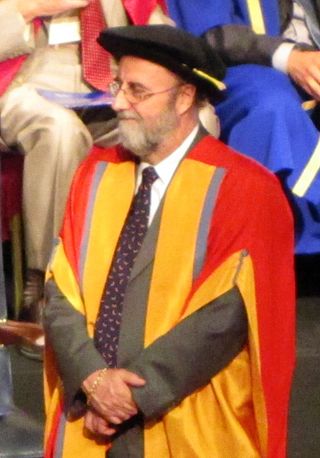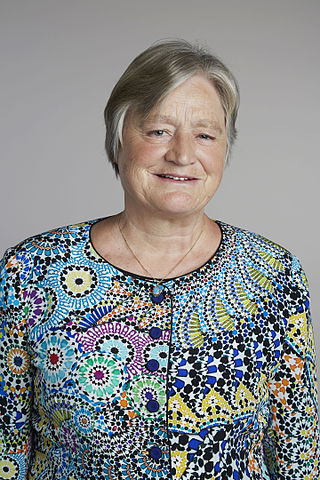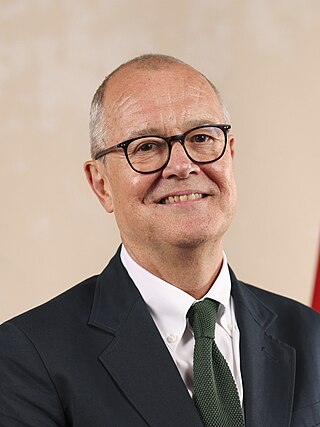Chief Scientific Adviser may refer to:
In most common law jurisdictions, the attorney general or attorney-general is the main legal advisor to the government. In some jurisdictions, attorneys general also have executive responsibility for law enforcement, prosecutions or even responsibility for legal affairs generally. In practice, the extent to which the attorney general personally provides legal advice to the government varies between jurisdictions, and even between individual office-holders within the same jurisdiction, often depending on the level and nature of the office-holder's prior legal experience.

Sir Robert Tony Watson CMG FRS is a British chemist who has worked on atmospheric science issues including ozone depletion, global warming and paleoclimatology since the 1980s. Most recently, he is lead author of the February 2021 U.N. report Making Peace with Nature.
The Advisory Council on the Misuse of Drugs (ACMD) is a British statutory advisory non-departmental public body, which was established under the Misuse of Drugs Act 1971.
In some countries, a senior advisor is an appointed position by the head of state to advise on the highest levels of national and government policy. Sometimes a junior position to this is called a national policy advisor. In some instances, these advisors form a council of state or a state council. Senior Advisor is also a title for senior civil servants or partisan advisors in several countries and is also used in nonprofit organisations.

The Office of Science and Technology Policy (OSTP) is a department of the United States government, part of the Executive Office of the President (EOP), established by United States Congress on May 11, 1976, with a broad mandate to advise the President on the effects of science and technology on domestic and international affairs.
The UK Government Chief Scientific Adviser (GCSA) is the personal adviser on science and technology-related activities and policies to the Prime Minister and the Cabinet. They are also the head of the Government Office for Science.
Office of the Chief Scientist may refer to:

Sir John Rex BeddingtonHonFREng is a British population biologist and Senior Adviser at the Oxford Martin School, and was previously Professor of Applied Population Biology at Imperial College London, and the UK Government Chief Scientific Adviser from 2008 until 2013.

The Council for Science and Technology (CST) is an advisory non-departmental public body of the United Kingdom government. Its role is to give advice on issues that cut across government departments to the Prime Minister, the First Minister of Scotland and the First Minister for Wales. It was established in 1993 and relaunched in 2003. It is based in London.

The Government Office for Science is a science advisory office in the UK Government. The office advises the Government on policy and decision-making based on science and long-term thinking. It has been led by Professor Dame Angela McLean, the Government Chief Scientific Adviser, since 23 February 2023.

Sir Peter David Gluckman is a New Zealand scientist. Originally trained as a paediatrician, he served as the inaugural Chief Science Advisor to the New Zealand Prime Minister from 2009 to 2018. He is a founding member and was inaugural chair of the International Network for Government Science Advice, and is president of the International Science Council.
A Legal Advisor is a person who provides legal advice, often in an official capacity. Government officials that qualify as lawyers (jurist) in certain countries can get the title Legal Adviser.

Dame Lesley Anne Glover is a Scottish biologist and academic. She was Professor of molecular biology and cell biology at the University of Aberdeen before being named Vice Principal for External Affairs and Dean for Europe. She served as Chief Scientific Adviser to the President of the European Commission from 2012 to 2014. In 2018 she joined the Principal's senior advisory team at the University of Strathclyde.

Julia Mary Slingo is a British meteorologist and climate scientist. She was Chief Scientist at the Met Office from 2009 until 2016. She is also a visiting professor in the Department of Meteorology at the University of Reading, where she held, prior to appointment to the Met Office, the positions of Director of Climate Research in the Natural Environment Research Council (NERC) National Centre for Atmospheric Science and founding director of the Walker Institute for Climate System Research.
Science advice is the process, structures and institutions through which governments and politicians consider science, technology and innovation information in policy- and decision- making. Across different national governments and international bodies, there are a variety of structures and institutions for scientific advice. They reflect distinctive cultures and traditions of decision-making, which Sheila Jasanoff has termed the ‘civic epistemology’ through which expert claims are constructed, validated or challenged in a given society.

Patrick John Thompson Vallance, Baron Vallance of Balham,, is a British physician, scientist, life peer, and clinical pharmacologist who has served as Minister of State for Science in the Department for Science, Innovation and Technology since July 2024. He previously served as the government chief scientific adviser from 2018 to 2023.

The Government of Canada's Chief Science Advisor is a post in the Canadian government that was created in 2017 by the Justin Trudeau government. The current advisor is Mona Nemer, who is a specialist in the genetics of heart disease and was vice-president of research at the University of Ottawa for 11 years. Dr. Nemer served an initial three-year term from September 2017 to September 2020, and has twice been reappointed to additional two-year terms. Her third appointment is scheduled to end in September 2024.
The Scientific Advisory Group for Emergencies (SAGE) is a British Government body that advises central government in emergencies. It is usually chaired by the United Kingdom's Chief Scientific Adviser. Specialists from academia and industry, along with experts from within government, make up the participation, which will vary depending on the emergency. SAGE gained public prominence for its role in the 2020 COVID-19 pandemic in the United Kingdom.

The Independent Scientific Advisory Group for Emergencies, better known as Independent SAGE, is a group of scientists, unaffiliated to government, that publishes advice aimed toward the UK government regarding the COVID-19 pandemic. Its name is based on SAGE, the name of the government's official Scientific Advisory Group for Emergencies.
The National Science and Technology Council is a council in the federal government's executive branch of the United States.